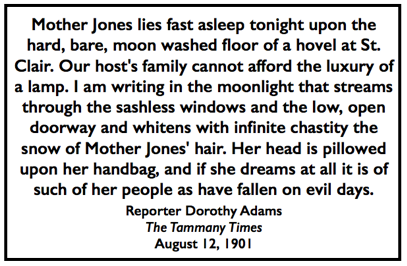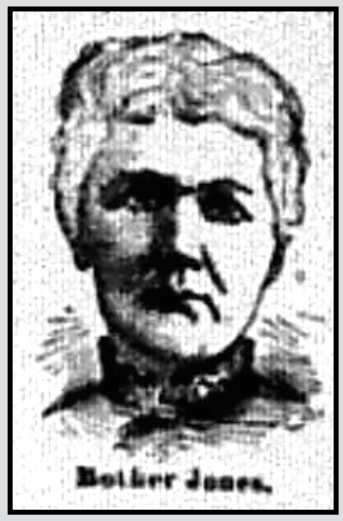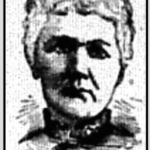![From The Progressive Woman of July 1911:The above picture includes most of the delegates to the Unity Convention of 1901 the convention where the Socialist party came into existence. It was held at Indianapolis, Indiana, beginning July 29. The picture was taken on the east front of the state capitol. A number of the faces will be familiar to many readers.There were about one hundred and twenty-five delegates present, among whom were the following women: Corinne S. Brown, Martha A. Biegler, Margaret Haile, Elizabeth H. Thomas, Sula Lowrie, Mrs. Max S. Hayes, Martha H. McHugh and Carrie Rand Herron.The Unity Convention was called for the purpose of attempting to unite the various Socialist parties of the country. The largest of these were the Social Democratic Party and the Springfield wing of the Socialist Labor Party. The other wing of the Socialist Labor Party did not take part in the convention. State parties in Iowa, Kentucky and Texas, not affiliated with any national organization, were represented.The various factions that united in calling the convention had patched up their differences sufficiently to support the same ticket the year before. Animosities were very bitter, however. Had it not been for the withdrawal of various local and state organizations from the national organizations, thus decreasing their membership, it is hardly probable that the two national organizations could have been persuaded to consent to try to form an organic union.The main actions of the convention were the adoption of a national constitution, a national platform, a resolution on Socialism and trade unionism, a resolution on injunctions, and a resolution on the negro question.The platform came in for a hot discussion, especially the immediate measures. As adopted, it contained, among others, a provision for "equal civil and political rights for women."The resolutions were also warmly discussed. In fact, everything was warmly discussed. Socialists are always very earnest in their debates, and the bitter feelings which the delegates brought along made them especially earnest at that convention.But the great debate came on the constitution. Hot does not begin to express it. It was scalding, vitriolic. All the rancor in the hearts of the delegates was poured out in blistering words. At times it seemed to the most optimistic that unity was hopeless, and that we must disperse and go back to our several locals with the doleful confession that we had failed in our mission. But, out of it all came agreement-agreement on the famous Section Four of Article Twelve. Get out your national constitution and read it. It is historic. It is the state autonomy provision. Around it raged the battle as to whether we could organically unite. Its adoption made unity possible.Then came better feelings and a great relief. We went home with joy in our hearts, because we bore the glad tidings of a solidified Socialist Party-united-facing the enemy.---------------[Emphasis added.]](https://weneverforget.org/wp-content/uploads/2021/07/Delegates-to-Unity-Founding-Convention-of-SPA-July-Aug-1901-Prg-Wmn-p3-July-1911.png)
The above picture includes most of the delegates to the Unity Convention of 1901 the convention where the Socialist party came into existence. It was held at Indianapolis, Indiana, beginning July 29. The picture was taken on the east front of the state capitol. A number of the faces will be familiar to many readers.
There were about one hundred and twenty-five delegates present, among whom were the following women: Corinne S. Brown, Martha A. Biegler, Margaret Haile, Elizabeth H. Thomas, Sula Lowrie, Mrs. Max S. Hayes, Martha H. McHugh and Carrie Rand Herron.
The Unity Convention was called for the purpose of attempting to unite the various Socialist parties of the country. The largest of these were the Social Democratic Party and the Springfield wing of the Socialist Labor Party. The other wing of the Socialist Labor Party did not take part in the convention. State parties in Iowa, Kentucky and Texas, not affiliated with any national organization, were represented.
The various factions that united in calling the convention had patched up their differences sufficiently to support the same ticket the year before. Animosities were very bitter, however. Had it not been for the withdrawal of various local and state organizations from the national organizations, thus decreasing their membership, it is hardly probable that the two national organizations could have been persuaded to consent to try to form an organic union.
The main actions of the convention were the adoption of a national constitution, a national platform, a resolution on Socialism and trade unionism, a resolution on injunctions, and a resolution on the negro question.
The platform came in for a hot discussion, especially the immediate measures. As adopted, it contained, among others, a provision for “equal civil and political rights for women.”
The resolutions were also warmly discussed. In fact, everything was warmly discussed. Socialists are always very earnest in their debates, and the bitter feelings which the delegates brought along made them especially earnest at that convention.
But the great debate came on the constitution. Hot does not begin to express it. It was scalding, vitriolic. All the rancor in the hearts of the delegates was poured out in blistering words. At times it seemed to the most optimistic that unity was hopeless, and that we must disperse and go back to our several locals with the doleful confession that we had failed in our mission. But, out of it all came agreement-agreement on the famous Section Four of Article Twelve. Get out your national constitution and read it. It is historic. It is the state autonomy provision. Around it raged the battle as to whether we could organically unite. Its adoption made unity possible.
Then came better feelings and a great relief. We went home with joy in our hearts, because we bore the glad tidings of a solidified Socialist Party-united-facing the enemy.
—————
[Emphasis added.]
 —————
—————

 —————
—————
 —————–
—————–![From The Progressive Woman of July 1911:The above picture includes most of the delegates to the Unity Convention of 1901 the convention where the Socialist party came into existence. It was held at Indianapolis, Indiana, beginning July 29. The picture was taken on the east front of the state capitol. A number of the faces will be familiar to many readers.There were about one hundred and twenty-five delegates present, among whom were the following women: Corinne S. Brown, Martha A. Biegler, Margaret Haile, Elizabeth H. Thomas, Sula Lowrie, Mrs. Max S. Hayes, Martha H. McHugh and Carrie Rand Herron.The Unity Convention was called for the purpose of attempting to unite the various Socialist parties of the country. The largest of these were the Social Democratic Party and the Springfield wing of the Socialist Labor Party. The other wing of the Socialist Labor Party did not take part in the convention. State parties in Iowa, Kentucky and Texas, not affiliated with any national organization, were represented.The various factions that united in calling the convention had patched up their differences sufficiently to support the same ticket the year before. Animosities were very bitter, however. Had it not been for the withdrawal of various local and state organizations from the national organizations, thus decreasing their membership, it is hardly probable that the two national organizations could have been persuaded to consent to try to form an organic union.The main actions of the convention were the adoption of a national constitution, a national platform, a resolution on Socialism and trade unionism, a resolution on injunctions, and a resolution on the negro question.The platform came in for a hot discussion, especially the immediate measures. As adopted, it contained, among others, a provision for "equal civil and political rights for women."The resolutions were also warmly discussed. In fact, everything was warmly discussed. Socialists are always very earnest in their debates, and the bitter feelings which the delegates brought along made them especially earnest at that convention.But the great debate came on the constitution. Hot does not begin to express it. It was scalding, vitriolic. All the rancor in the hearts of the delegates was poured out in blistering words. At times it seemed to the most optimistic that unity was hopeless, and that we must disperse and go back to our several locals with the doleful confession that we had failed in our mission. But, out of it all came agreement-agreement on the famous Section Four of Article Twelve. Get out your national constitution and read it. It is historic. It is the state autonomy provision. Around it raged the battle as to whether we could organically unite. Its adoption made unity possible.Then came better feelings and a great relief. We went home with joy in our hearts, because we bore the glad tidings of a solidified Socialist Party-united-facing the enemy.---------------[Emphasis added.]](https://weneverforget.org/wp-content/uploads/2021/07/Delegates-to-Unity-Founding-Convention-of-SPA-July-Aug-1901-Prg-Wmn-p3-July-1911.png)